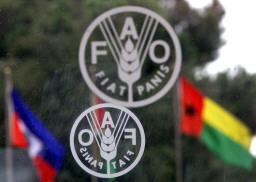A global summit to tackle the world's food crisis opened here Tuesday with leaders urging action against rising prices that threaten hundreds of millions.
''No one can ignore the dramatic crisis that has exploded and its consequences for the poorest populations, for almost a billion undernourished people,'' Italian President Giorgio Napolitano said in opening the summit.
Some 44 leaders are attending the gathering at the United Nations Food and Agriculture Organization (FAO) here, including controversial Iranian President Mahmoud Ahmadinejad, on his first trip to the European Union, and Zimabwean President Robert Mugabe whom many accuse of devastating his country's economy.
Delegates at the three-day UN summit on World Food Security and Climate Change will discuss trade, aid, technology, global warming and controversial questions like biofuel, blamed by many for feeding the crisis.
Napolitano said the international community had gradually shown ''a new awareness'' of these problems as global food prices of staples like rice and wheat doubled over the last two years.
He stressed that relying on market mechanisms alone would be a mistake.
''One cannot overcome the crisis and ensure the prospect of real food security by relying on the rebalancing virtues of the market,'' Napolitano said.
The Italian head of state said the world was looking ''with confidence'' to the task force being set up by UN Secretary-General Ban Ki-Moon and ''believed in'' the role of the FAO, the International Fund for Agricultural Development (IFAD) and the World Food Program (WFP), the three UN agencies which Italy was ''honoured to host''.
But he also called for ''a spirit of criticism...in the search for possible errors'' in underestimating the crisis.
Agencies were probably ''slow'' to evaluate ''the radical change'' that would be caused by the ''impetuous'' growth of emerging economies like China and India, he said.
In his address, Ban Ki-Moon called for a 50% rise in world food stocks by 2030 and remarked that rich nations' food subsidies distorted the market to the detriment of producers in the developing world.
FAO chief Jacques Diouf said that, at present, 862 million people do not have enough food in the developing world - but the developed world, too, was feeling the impact of the crisis through rising inflation.
''The important thing to realise is that it is no longer the time for words but for action,'' he said.
Diouf was echoed by Italian Premier Silvio Berlusconi, chairing the session, who proposed that food aid should be kept off EU budgetary accounts.
Among the first speakers, Brazilian President Luiz Inacio Lula da Silva said the crisis was ''an insult to humanity'' and Egyptian President Hosni Mubarak called for ''a global partnership'' on food.
Pope John Paul II sent a message to the summit saying that ''hunger and malnutrition are unacceptable in a world that has levels of production, resources and know-how sufficient to put an end to such dramas and their consequences''.
While biofuels will be a key talking point here, with some big producers like Brazil set to defend them, many other countries will be stressing the need for fair trade, safety net programmes, and an end to both export bans and farm support.
GMOs (genetically modified organisms) will also be another point of contention, experts predict.
Ahmadinejad, on his arrival at Rome airport, was unrepentant about his reiterated statement Monday that Israel would be ''wiped off the map'' and contended that ''Europe has suffered the most from the Zionists''.









